
Flying over the French Pyrenees there is a tailwind causing some turbulence, I am on my last flight home between the UK and Alicante after ten months of travelling. It feels weird to be boarding an Easy Jet plane, a familiar face but with a side effect of surrealism as we queue in the surroundings of a half-empty check-in at Gatwick Airport. Have the days of a busy and exciting airport experience come to an end? It is empty, sterile and I get the feeling I am being watched. Could this be the opening scene of a sci-fi Netflix series that promotes long and lingering episodes one falls asleep to in the early hours?
Trying to balance my laptop on my tray table through the bumpy turbulence, I thought I could use the journey to scroll through some old articles to edit whilst I have a breather from any social media interruptions. Coffee is no longer on the agenda but my new blog has been fun to create and has given me the opportunity to read through some past posts, evoking some fond memories I have made on my travels.
Mindful of how life in the world has changed for so many during this pandemic, it leads me to wonder if we are aware of the lessons we have taken and have we learnt enough now to change our actions? The said article takes me back to my first visit to India in 2018 two years before the era of Covid19. The article is titled ‘In Search of Empowerment,’ a subject that has been provoking my thoughts for decades.
Covid19 has forced us into a situation where we find ourselves re-evaluating our actions of the past. We look back to analyse, often experiencing feelings of anger at society, bringing us to the brink where change has to be addressed. Societal issues, Religion, BLM, Protest marches, Banners held high above our heads, History cannot be changed but our futures can. We have rights, we have value, all voices must be heard. Are we now walking towards a brave new world or are we collapsing all that we have strived to work towards? I beg the question. Will society, post Covid19 walk into a revolution? I hope so, however, let us for once, take the lessons of past revolutions and learn from them. Take the good and discard the bits that never worked, Just saying.
The changes that are coming, and they certainly are, usually means progress in the grander scale of life. If our future has to be safe and secure we must learn to listen to that inner voice. May it be calm and showered with love and compassion for all. We are the change and we do have the power to set the rules. Change is not about forgetting the past, it is about enhancing it.
The work that has ground to a halt pre-COVID lockdown must carry on needlessly. However, we will have to be patient. We never unlearn skills we have mastered. Have we listened to the planet, the universe and the gods of all religions? Whatever you believe, never stop believing in humanity and what it can achieve.
Out of calamity and crisis, you will always see new colours emerge.
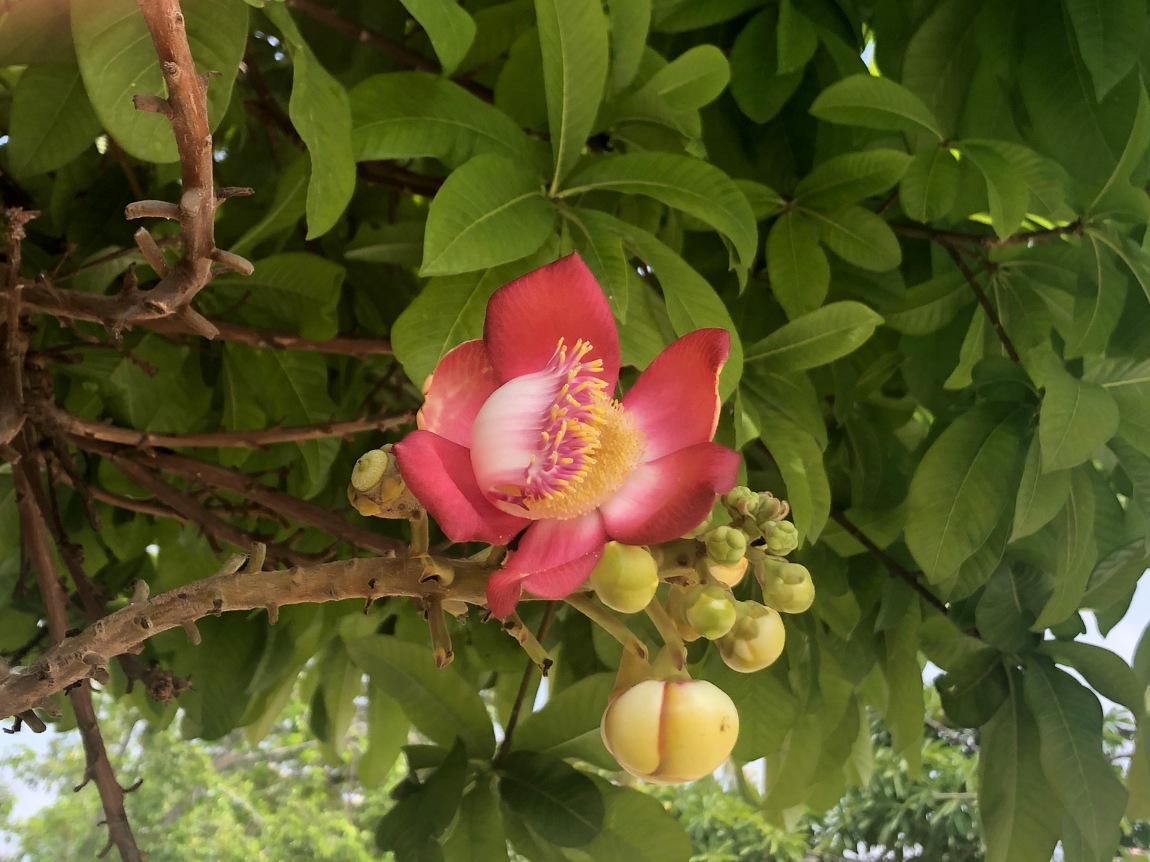
So some of us will step back to hopefully make a greater leap forward. The work I witnessed in India by the Saksham Project, the mastermind of Nitin and Deepti Sharma, will not I greatly fear be so easy. Sadly the school and the workroom has had to close down for the time being. They remain positive although Nitin has admitted to me he has cried when he saw five years of hard work closed down.
This work was always tough but he realises a lot of good was done and that can never be undone. We can always work toward building another school. As I read through the article which I had written two years ago I realise how important it is to go back there. This time with the extra lessons that COVID19 has forced us to learn.
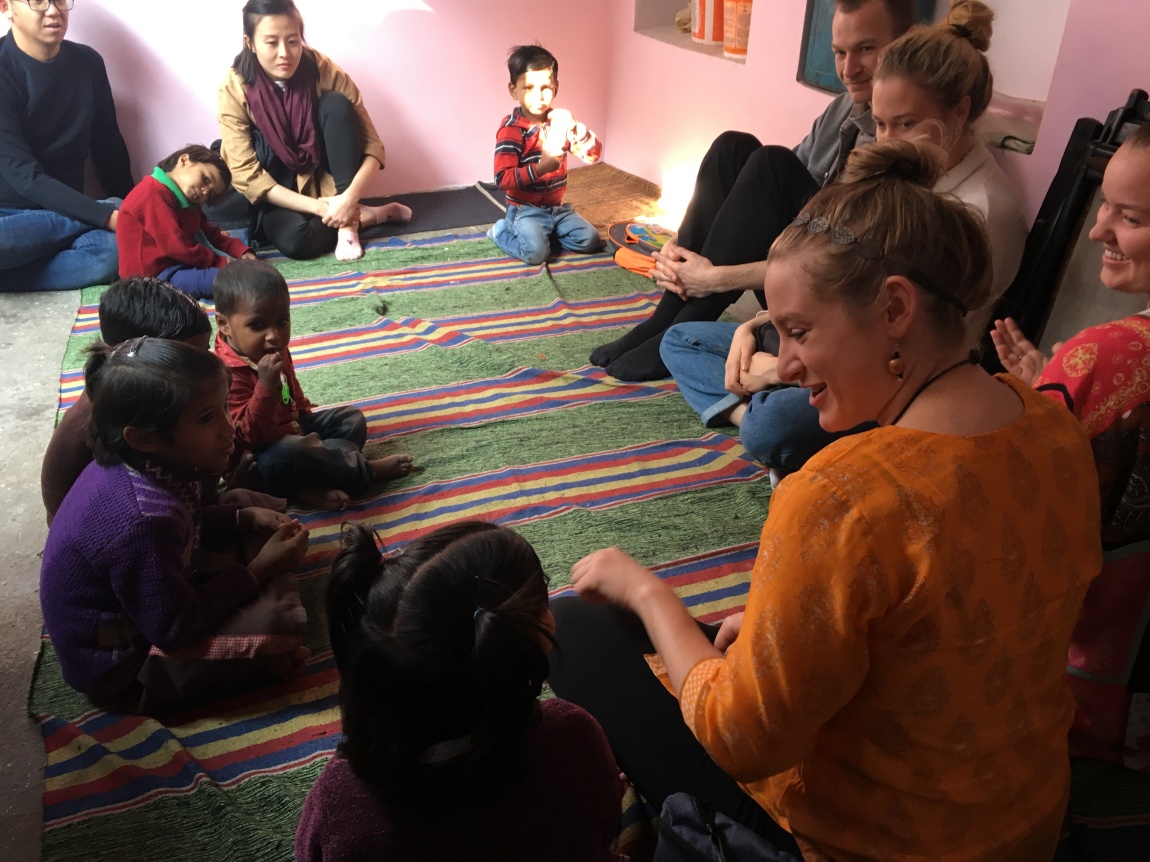

Joe my son has an idea that he wants to write something about people, especially females, who have been brought up in strict religious environments and have escaped. He is thinking of friends in the US.
We must appreciate how indoctrinated some societies are. Good and evil is in everything but the good and evil is not always defined to what some people are led to believe. When a western woman thinks of empowerment it is a long way from what a woman living in the slums of Jaipur has to deal with. There are many more issues. Some as simple as her choice of marriage and the decisions she is allowed to make for her family. When I spoke to some of the younger women on this trip, they define empowerment with one word. FREEDOM.
The work I witnessed on a small slum in Jaipur was good in every way. It was breaking through outdated restrictions and was bringing education and love for the purpose of showing women and their children that they also had value.
The article confirms that we have not come to the end of this project but the beginning of a new and even better one. As I think of the people I have crossed paths with on this trip, I have faith that we shall see more achievements in helping these families improve their lives. The borders are closed and it will be difficult for me to return in the foreseeable future but we are not giving up.
Jaipur 2018. FIROZA. In search of Empowerment.
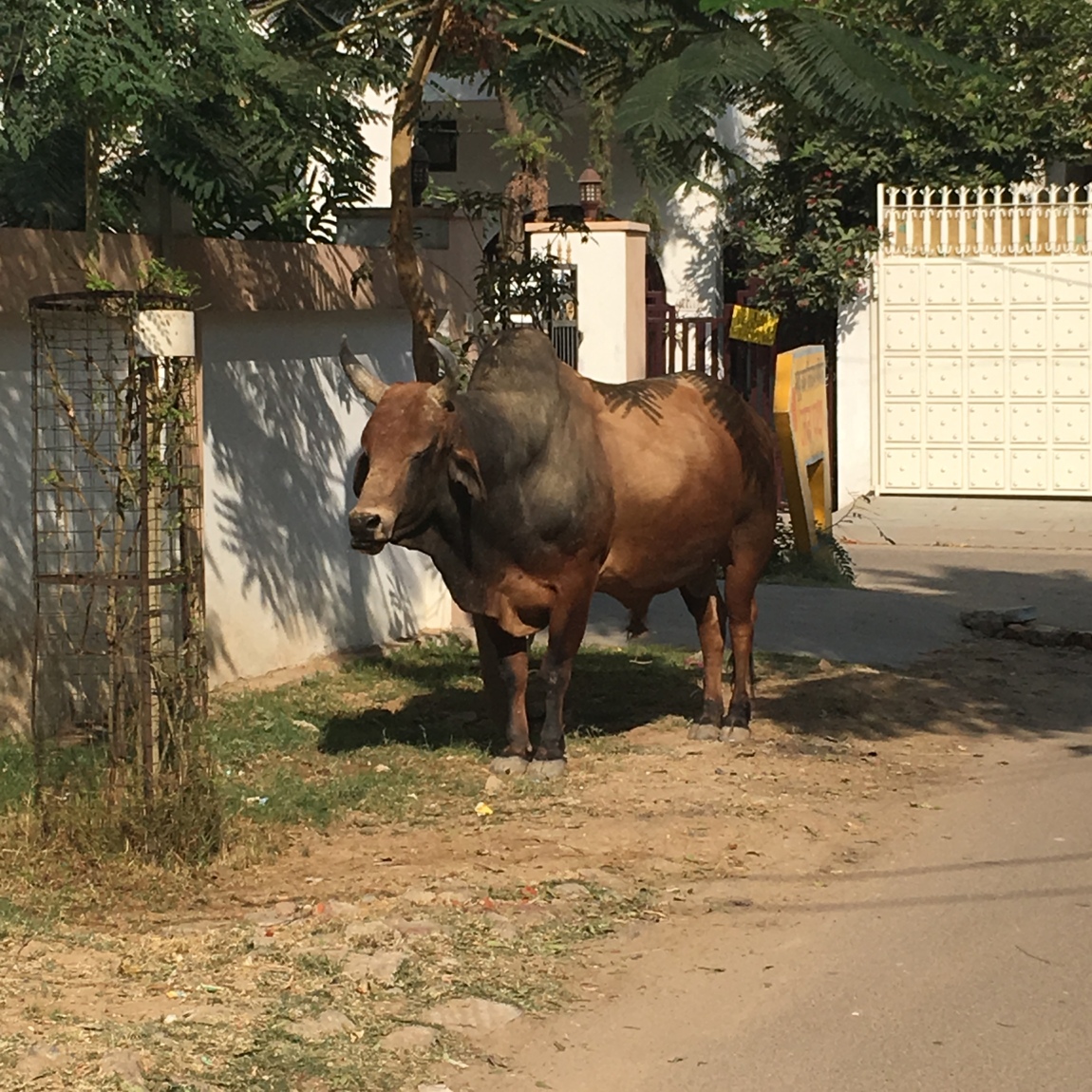
As the sun sets over the city of Jaipur, we walk through the dust and pollution of a street alive with activity. It is hard to describe the noise of the traffic as cars, bikes and carts weave around us in a frenzy, there is tiredness on weary faces which so often illuminates with cheer as the local people wave and move forward to greet you. We are going to visit Firoza, a 42-year-old mother of four children. She lives in a slum district in Jaipur, Rajasthan in India. Firoza’s house is the size of a small brick tool shed and is joined to three other similar sheds which are all surrounding a small courtyard and sandwiched between two half-empty taller buildings.

Firoza welcomes us in. Her room is painted a pretty lilac colour, it is clean, cosy, and minimal. Her huge bed dominates the space, here she sleeps with her husband and her two youngest children of 12 and 9 years old.
We are invited to sit on the bed, there is only room for a couple of chairs. Firoza lays out a small plastic tablecloth, and we are brought tea and poppadum’s prepared by one of her neighbours, a young girl from one of the shelters.
It is a hard existence but Firoza is fortunate, her life has received some improvements because of her work opportunity within the Saksham project. During the past one and half years she has been able to pay for a new roof for her small bedroom/shelter. I look above my head to the tin roof. I am curious for a short moment, wondering what it must have been like for Firoza and her family, especially during the rainy season.
The Saksham Project is the brainchild of husband and wife team Nitin and Deepti Sharma, their aim is to empower women who live in the slums. Firoza is one of their success stories and they were keen for us to meet her. Over the last couple of weeks that I have spent time watching the endless hours it takes to work on a project such as this, I am impressed by the positive energy by everyone wanting to become involved. Western travellers hear about the achievements of this project and are keen to meet the children and their families. ‘How can we help,’ they all ask.
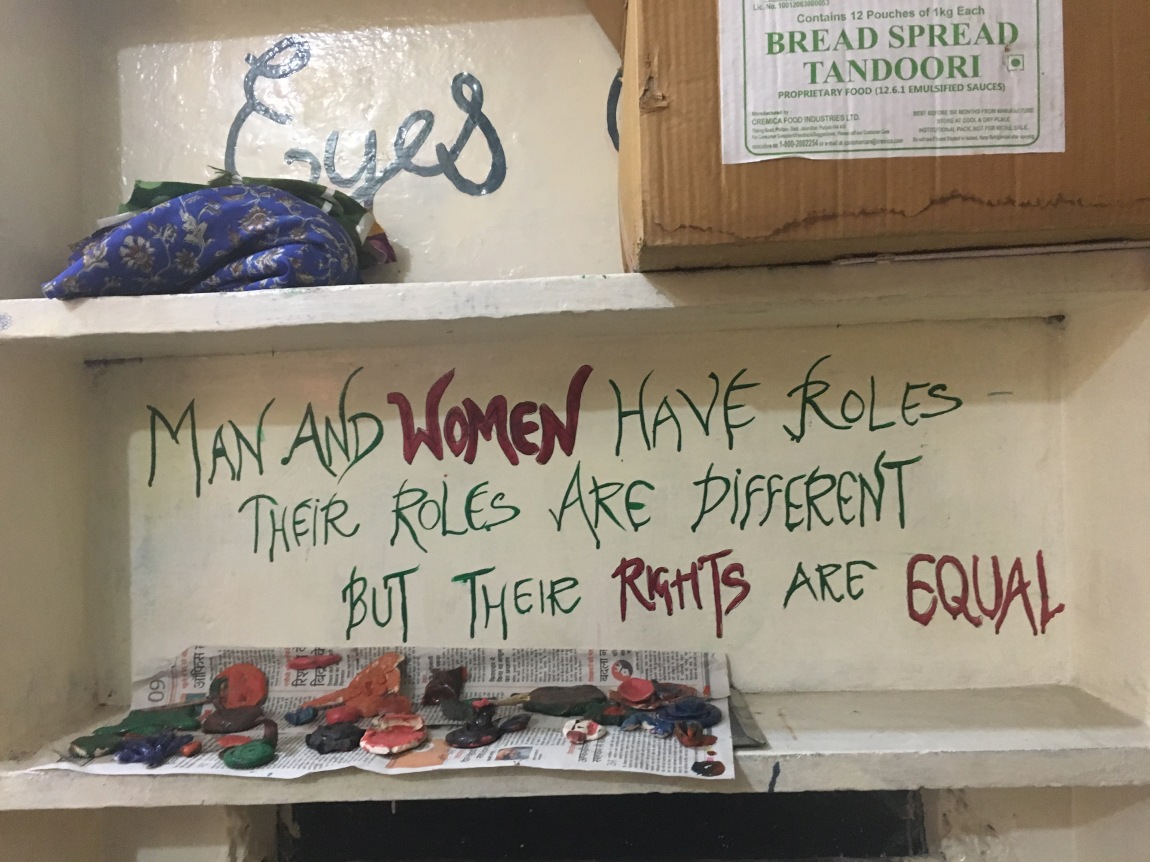
The project has many aims and realises the importance of the influence needed on women living in the slums, giving a direct route to finding empowerment and sustainable change. Women are wonderful, multi taskmasters when faced with opportunities. The hurdles are to show them that life improves when you can aspire to change and change is not always a bad thing. It has to be facilitated slowly and with respect so not to cause a problem to cultural or religious obligations. Women in third world countries look to aspire to ways which the women in the West take for granted, however, we need to comprehend that, these aspirations may not be as we would wish to impose on them with any urgency. Put simply, women in third world countries still have the many hurdles our grandmothers and great grandmothers were jumping over a century ago.
But freedom is coming too fast for many. Firoza has a mobile phone and watches YouTube whilst her husband is still trying to come to terms with the fact that she leaves her shelter and goes to work independently of his needs and demands.
The Saksham Project encouraged Firoza to attend school to learn basic reading, writing and mathematical skills. Firoza told us she now feels less taken advantage of when buying things at the market. It can be as simple as that to make a positive difference. The Sharma’s then discovered that Firoza also had a sewing talent, passed down to her by her mother who taught her to measure and sew by hand.
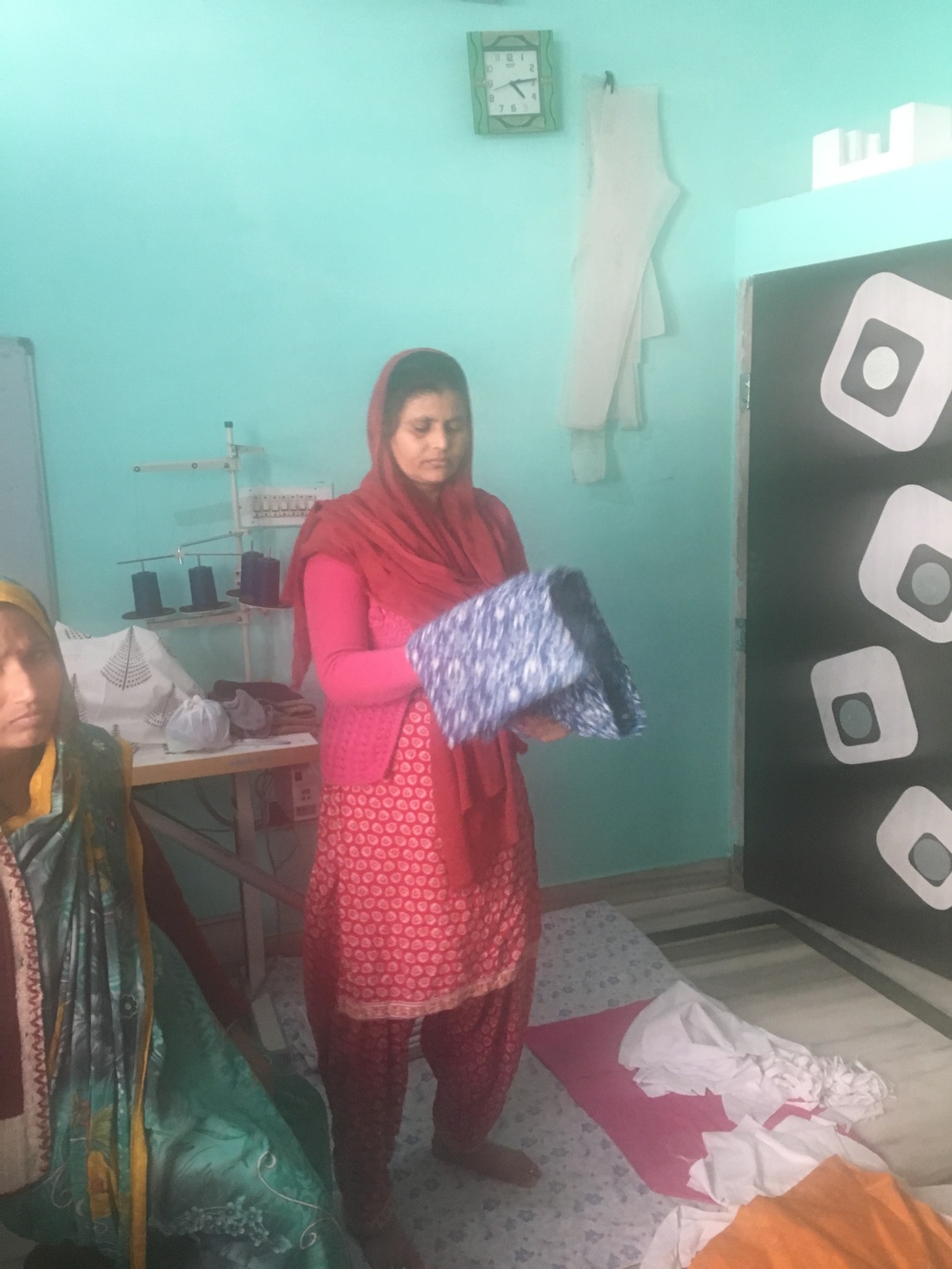
Nitin explains. ‘We needed to recognise her talent to instil confidence and so she could feel good about herself.
This is the first part of the process of empowerment. The Saksham Project took on the task of creating a workroom by renting a room in the slum area, where it would be easy for Firoza to create garments. They purchased a few sewing machines and a selection of fabric. Here she is able to pass on her skills to the other women who live in the slum. The aim is to set up a small business or co-operative so they will be able to use these new-found skills, the woman can be in control of their own finances and more importantly feed their families and keep their children away from sorting garbage. Nitin explained it will be a long process, first they have had to promote the power and importance of education, encouraging parents to let their children attend a small classroom for simple lessons. Presently there are three classes, one for the smaller children where they learn songs and play games, the second is for the older children and there is a class for the mums who are unable to read and write. English is taught in all of these classes. This has been a costly process for Nitin and Deepti Sharman as they have had to dip into their own funds to keep the school operating every day and paying teachers to provide lessons. Now with more help and recognition from visitors and friends, the project is working towards a charitable status from the ground upwards. Deepti expressed passionately, we want the women to do it for themselves rather than receive handouts but we badly need money to start some of our projects. Firoza needs more sewing machines and better training, at the moment she is relying on Youtube videos and Pinterest to find new designs. We need to find ways of helping the workroom to operate by finding them orders and new markets. If we can get it working then we will really be empowering woman to make a difference to their lives.
We ask Firoza if she feels motivated now she is part of the project. I quickly realise what a difficult question that is for her. ‘I am more confident with the things I make,’ she tells us; however, I find myself eager to know if she feels empowered. Firoza and the ethos that surrounds her culturally will hold her in a different perspective. What we in the west aspire to as empowering women is far away from Firoza and her world, though deep down we all crave the same. ‘Freedom,’ to be in control of our own destinies and to keep our families loved and safe.
Firoza is happy to know she now has enough money every month to feed her children. You can see the happiness in her eyes. Maybe she does not know it yet, with the help of the Saksham Project she will have a chance of a future where she will learn to embrace new ideas that will inspire her. She will learn about creativity and what she holds in her own hands that will improve her conditions and make the changes to the lives of others. For now, it is the small and gracious gifts of other people who understand what poverty really does mean and who offer opportunities to make her life fulfilling and sustainable. The on-going success of The Saksham Project and the visionaries who offer hope, whatever it takes, must continue.
Can You Help?
Unfortunately because of COVID19 the Saksham Project has temporarily closed. It will be a mega task to get it up and running again. Nitin and Deepti are looking for new premises. Because the project was funded by his AirBNB takings from travellers there is no money so we are looking for alternative sources. The children are presently not in school and the women have stopped their lessons and sewing work. This year I started Daadi which was to help them find orders to create an organic clothing range. We still plan to carry on with this work in the hope that they shall be able to carry on the project. Anyone wishing to offer any help please get in touch.
LINKS









